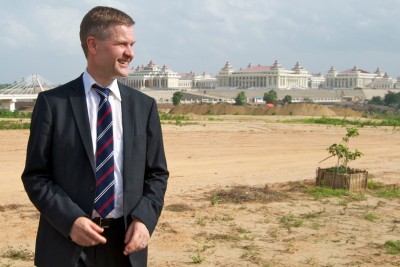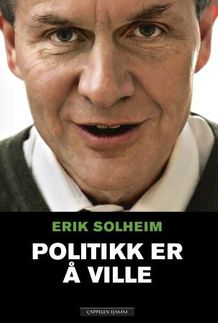Politician Erik Solheim loved his job as government minister in charge of foreign aid and the environment, and hated losing it last year amidst a change in command at the Socialist Left party (SV) that he also once led. Now he’s written his memoirs so far, and his new book was still making waves over the weekend.

“Bitter, poor thing,” remarked one political commentator in a summary of the week’s political drama after he’d been compared to a “sewer pipe” himself in Solheim’s book. Solheim insists he’s not bitter, just squaring up after a traumatic year that ended with a new job: The former globe-trotting Norwegian minister has moved to Paris, where he now leads the Development Assistance Committee for the international Organisation for Economic Cooperation and Development (OECD).
Solheim traveled back to Oslo to launch the book, which immediately grabbed lots of headlines, topped newscasts and sparked political debate. Its main message reflects its title Politikk er å ville, which roughly translates to politics being about really wanting to get things done. “Just do it,” is another phrase Solheim bandied about. Norwegian politicians from one end of the spectrum to the other have a hard time doing much of anything, according to Solheim.

He relates, for example, how he proposed setting aside 1 percent of the assets in Norway’s huge sovereign wealth fund, commonly known as the “Oil Fund,” to invest in hydropower, solar energy and wind power in poor countries. He believed it would give a new boost to the left-center government he was part of. But nothing happened. The proposal stalled, despite all the government’s emphasis on environmental and climate issues. Solheim told newspaper Dagens Næringsliv (DN) that Prime Minister Jens Stoltenberg is too preoccupied “with keeping the Norwegian economy in order. I have great respect for that. Where we differ is over why we can’t be a bit more brave in other areas? Why in the world can’t we have an investment plan for renewable energy when we can have one for Regent Street?” Solheim was referring to the oil fund’s major investments in real estate, not least on Regent Street in London.
He had much harsher criticism of other former political colleagues, not least within his own party. Audun Lysbakken, the young man who took over as SV leader and summarily replaced Solheim in a parliamentary reshuffle, is accused in his book of carrying out “student politics,” for his constant attempts to distance Norway from the US. “He lashes out with anti-Americanism that he claims is in the bone marrow of the left, like the Conservatives lash out at Russia and China,” Solheim claims. Solheim rather thinks the US is, “in an historic perspective, the most restrained world power the world has seen.” He thinks the US is mostly “a defensive power that wants stability in the world.”
Solheim saved his most scathing criticism for Thorbjørn Jagland, the former Labour Party foreign minister and prime minister who now heads the Council of Europe and the Norwegian Nobel Committee. In a chapter that translates to “Jagland’s destructive ego,” Solheim accuses Jagland of sabotaging the peace process in Sri Lanka and stabbing his own negotiators in the back. He also suggests that Jagland’s undaunting support for the committee’s decision to award the Nobel Peace Prize to Chinese dissident Liu Xiaobo was a big mistake that’s more likely to hinder democratic development than promote it.
Solheim had some high praise for politicians outside his own party, including Bjarne Håkon Hanssen, Trond Giske, Erna Solberg and Knut Arild Hareide. He doesn’t think the current left-center government coalition will win a third term this fall, mostly because it’s spending too much energy warning about a shift to the right instead of stressing its own accomplishments. And because it hasn’t “dared to do the big things.”
Most of the politicians fired on by Solheim took his criticism with a smile, said they thought Solheim was bitter indeed or that he was resisting a generational change. “It is difficult when we’ve rounded 50 years and there are 30-year-olds who have experience, are good leaders and who make decisions based on their own evaluations,” his former party leader Kristin Halvorsen told newspaper Aftenposten. “We just have to realize that there also are competent people who are younger than us.”
Views and News from Norway/Nina Berglund
Please support our news service. Readers in Norway can use our donor account. Our international readers can click on our “Donate” button:

